
Billy Ray Cyrus is an American country singer and actor. He has released 16 studio albums and 53 singles since 1992, and is known for his hit single "Achy Breaky Heart", which topped the U.S. Hot Country Songs chart and became the first single ever to achieve triple platinum status in Australia. It was also the best-selling single in the same country in 1992. Due to the song's music video, the line dance rose in popularity.

Ellen Muriel Deason, known professionally as Kitty Wells, was an American pioneering female country music singer. She broke down a barrier to women in country music with her 1952 hit recording "It Wasn't God Who Made Honky Tonk Angels", which also made her the first female country singer to top the U.S. country charts and turned her into the first female country superstar. “It Wasn’t God Who Made Honky Tonk Angels” would also be her first of several pop crossover hits. Wells is the only artist to be awarded top female vocalist awards for 14 consecutive years. Her chart-topping hits continued until the mid 1960s, paving the way for and inspiring a long list of female country singers who came to prominence in the 1960s.
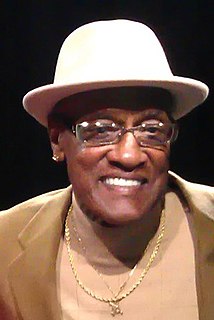
Paul Williams, known professionally as Billy Paul, was a Grammy Award-winning American soul singer, known for his 1972 No. 1 single "Me and Mrs. Jones", as well as the 1973 album and single War of the Gods, which blends his more conventional pop, soul, and funk styles with electronic and psychedelic influences.
"Pledging My Love" is a blues ballad. It was written by Ferdinand Washington and Don Robey and published in 1954.

"I Can't Stop Loving You" is a popular song written and composed by country singer, songwriter, and musician Don Gibson, who first recorded it on December 3, 1957, for RCA Victor Records. It was released in 1958 as the B-side of "Oh, Lonesome Me", becoming a double-sided country hit single. At the time of Gibson's death in 2003, the song had been recorded by more than 700 artists, most notably by Ray Charles, whose recording reached No. 1 on the Billboard chart.

The Complete Capitol Singles Collection is a compact disc box set by the American singer Frank Sinatra, released on Capitol Records in 1996. The four-disc set contains all 45 singles released by Sinatra during his tenure at the label between 1953 and 1961. Of those, 25 made the Top 40 on the Billboard singles chart. It does not include releases specifically for jukeboxes or for extended play singles, with one exception. The original tapes were digitally remastered by Bob Norberg.
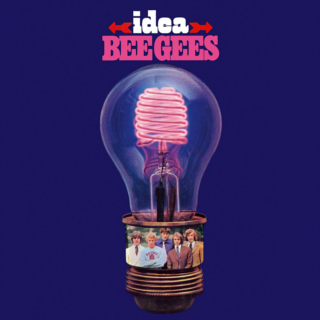
Idea is the fifth album by the Bee Gees. Released in September 1968, the album sold over a million copies worldwide. The album was issued in both mono and stereo pressings in the UK. The artwork on the Polydor release designed by Wolfgang Heilemann featured a "beehive" neon lightbulb with a group photo in its base, while the North American ATCO release designed by Klaus Voormann featured a composite head made from each band member. It was their third internationally released album - the first two albums being released only in the Australian market.
The singles discography of Kitty Wells, an American country artist, consists of ninety singles, nineteen B-sides, and two music videos. In 1949 she was signed to RCA Victor Records, where she released her debut single, "Death at the Bar" also in 1949. Dropped from RCA in 1950, Wells signed with Decca Records and released the single "It Wasn't God Who Made Honky Tonk Angels" in 1952. The song was an answer song to Hank Thompson's hit, "The Wild Side of Life", spending six weeks at number one on the Billboard Magazine Hot C&W Sides chart. The single sold one million copies and made Wells the first female country artist to have a single reach number one on the Billboard country list. Until the end of the decade, Wells became the only woman on the country chart that would consistently receive radio airplay. In 1953 the song, "Paying for That Back Street Affair" reached #6 on the Billboard Hot C&W Sides list, as well as twenty one additional Top Ten singles on the same chart between 1953 and 1959. This included singles such as the Red Foley duet "One by One" (1954), "Making Believe" (1955), "I Can't Stop Loving You" (1958), "Mommy for a Day" (1959), and "Amigo's Guitar" (1959). The latter song was written by Wells herself and later won her a BMI Songwriter's Award.
Willie "Jay" Lee Webb was an American country music singer. He is known for his 1967 song, "I Come Home A-Drinkin' ", which was written as an "answer song" to his older sister Loretta Lynn's #1 1967 hit "Don't Come Home A Drinkin'".

Herbert Paul Gilley was an American country music lyricist and promoter from Kentucky. In his lifetime, he was little known as a songwriter, but decades after his death by drowning at age 27, he was identified more widely as likely having written the lyrics to a dozen famous songs, including two that were hits for Hank Williams: "Cold, Cold Heart" and "I'm So Lonesome I Could Cry". He may have also written "I Overlooked an Orchid", which was a number-one country hit in 1974 for Mickey Gilley. Other songs that have been attributed to Gilley include "If Teardrops Were Pennies", "Don't Let the Stars Get in Your Eyes", and "Crazy Arms".
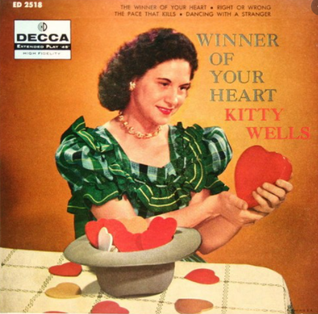
Winner of Your Heart is an album recorded by Kitty Wells and released in 1956 on the Decca label.

Kitty Wells' Country Hit Parade is an album by Kitty Wells that was released in 1956 on the Decca label. Joe Viglione of Allmusic.com gave it four stars and called it "groundbreaking", "a classic of the genre", and "entertaining beyond its historical importance."

The Kitty Wells Story is a double album consisting of re-recordings of the greatest hits of Kitty Wells. It was released in 1963 on the Decca label.

Lonesome Sad and Blue is an album recorded by Kitty Wells and released in 1965 on the Decca label in the United States and on the Brunswick label in the United Kingdom. Thom Owens of Allmusic gave the album three stars and called it "a typically enjoyable set of country ballads and weepers."

The Kitty Wells Show is a live album recorded at a concert by Kitty Wells, her son Bobby Wright, her husband Johnny Wright, singer Bill Phillips, and musicians Tommy Jackson, Paul Yandell and Odell Martin. The album was released in 1966 on the Decca label in the United States and on the Brunswick label in the United Kingdom.

Queen of Honky Tonk Street is an album recorded by Kitty Wells and released in 1967 on the Decca label in the United States and on the Calendar Records label (SR66-9640) in Australia.

Showcase is an album recorded by Kitty Wells and released in 1968 on the Decca label. In the United Kingdom, it was released by MCA Records with the title My Big Truck Drivin' Man. The album's title track, "My Big Truck Drivin' Man", was Wells' final top 40 hit, peaking at No. 35 on the Billboard country chart.
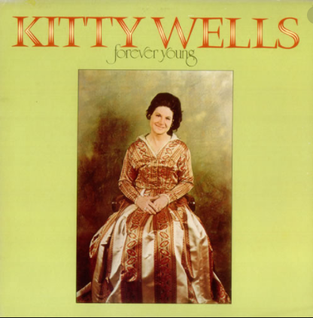
Forever Young is an album from Kitty Wells that was released in 1974 on the Capricorn label.

Guilty Street is an album by country singer Kitty Wells, released in 1969 on the Decca label. The album included two songs that charted on the Billboard country singles chart: "Happiness Hill" and "Guilty Street".
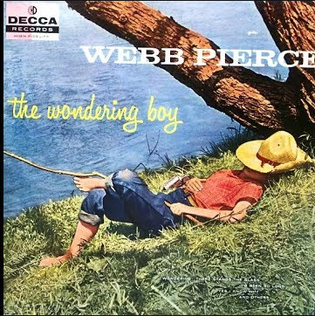
The Wondering Boy is an album from honky-tonk singer Webb Pierce that was released in August 1956 on the Decca label. Stephen Thomas Erlewine of AllMusic called the album "one of his best albums of the '50s" with a "dynamite" track sequence.

















